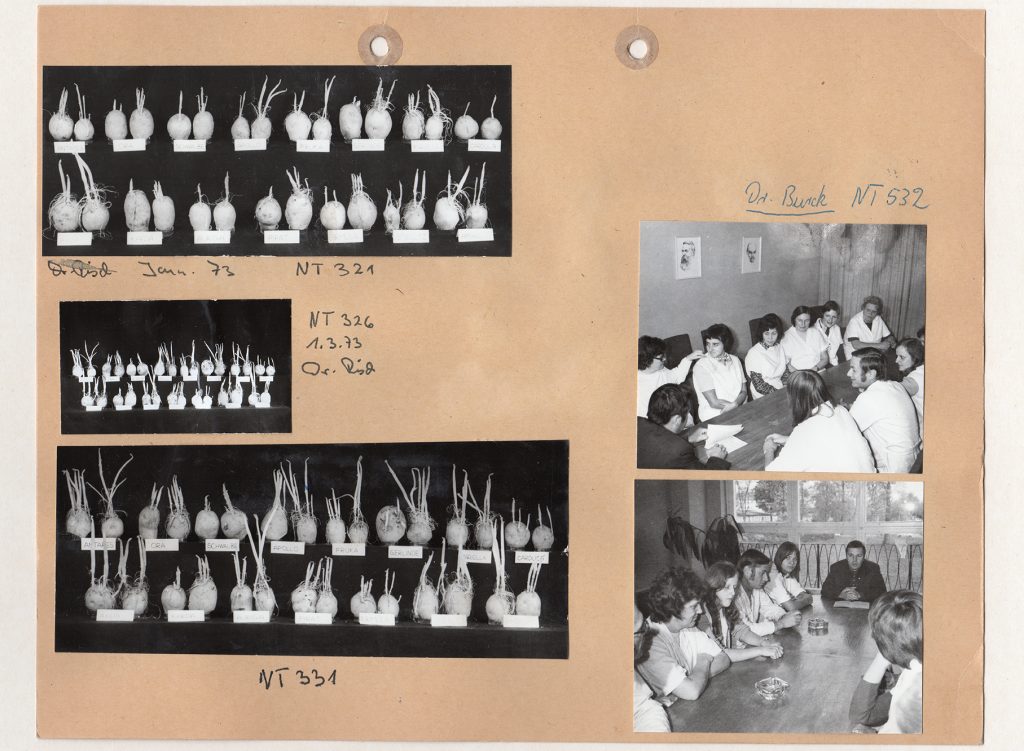Scroll down for English
Välkommen till en presentation och samtal med konstnären Åsa Sonjasdotter, om ett projekt om två arkiv med anknytning till jordbruk och växtförädling. Introduktion och moderering av Maria Lind.
De två arkiven – bearbetade genom konstnärerna Åsa Sonjasdotter och Elske Rosenfelds forskning i samarbete med curator Misha Lylov – utforskas som former av slumrande kunskap som latenta eller aktiva källor till motstånd och oliktänkande.

Bild reproducerad med tillstånd avKulturhistorischer Verein Groß Lüsewitz (Groß Lüsewitz Cultural Historical Association)
Institutet för växtförädling
Läs mer om presentationen och konstnären nedan (på engelska)
English
Dormant Knowledge: Sources of resistance and dissent
Date: Wednesday June 7, 2023
Time: 6:00 – 7:30 pm
Place: IASPIS/Konstnärsnämnden
Address: Maria Skolgata 83, Stockholm, Sweden
Language: English
Free admission, no reservation needed
Welcome to a presentation and conversation with artist Åsa Sonjasdotter about a project on two archives related to agriculture and plant breeding.
The two archives – processed through the research of visual artists Åsa Sonjasdotter and Elske Rosenfeld in collaboration with curator Misha Lylov – are explored as forms of dormant knowledge that are latent or active sources of resistance and dissent.
Two different archives are at the heart of this story, told in text and images. It is centring around an unusually sturdy potato that is said to have saved many lives in the Eastern bloc, and the research institute which created it: One is the photographic archive of the former Institute for Plant Breeding in Groß Lüsewitz in the GDR. Compiled by photographers employed by the Institute 1948 – 1990 in order to document the development of the Institute, as one of the major centres for agricultural research in the Eastern bloc, it also documents the village itself. Although the village was a model village for the industrialisation and urbanization of agriculture in the GDR, the archive was thrown in a rubbish dump when the Institute changed ownership in 1990, but it was saved by a former employee.
The second archive is the potato Adretta, which was developed at the Institute, and certified in 1975. Like all cultivated tubers, Adretta in and of itself is an archive of a breeding process, a continuous human-plant-dialogue, dating back to prehistoric times when agriculture began. Adretta became a success, because of its robustness, which suited the needs of the large-scale farming units of the planned economy. It was soon cultivated widely, not only in East Germany, but also throughout the Soviet Union. After 1990 it no longer met the requirements of the new, capitalist economy. As an archive, Adretta is fragile. It needs to be replanted each season to survive. But it fared better than the photo archive of Groß Lüsewitz: Adretta has become one of the most beloved and prevalent staples of post-Soviet subsistence farmers from Latvia to Siberia.
Dormant Knowledge: Sources of resistance and dissent is an event within the project The Prism of the Past: An exchange on critical cultural heritage.
Åsa Sonjasdotter is an artist and researcher engaging in processes for the repair of overlooked and damaged more-than-human relationalities, enquiring memory, loss and prospect through the cultivation of soils, plants, imagery and stories. Her recent film, Cultivating Abundance, inquires cultures of cultivation and the breeding of plants. Sonjasdotter’s work is presented, screened, published, and exhibited in numerous and various contexts. For further information: asasonjasdotter.info.
Maria Lind är curator, konstskribent och utbildare. Sedan 2020 arbetar hon som kulturråd på Sveriges ambassad i Moskva.
The Prism of the Past: An exchange on critical cultural heritage is a project and platform for exchange between artistic practitioners, researchers, historians and curators within the fields of craft, architecture, design, art and cultural production at large. The purpose is to establish connections and to develop exchange of competence, experience and knowledge around “critical cultural heritage”. The project develops through a series of online and physical meetings that started in 2022, aiming at in various ways highlight and discuss examples of practice and theory. The Prism of the Past: An Exchange on Critical Cultural Heritage is initiated as a collaboration between Maria Lind, Cultural Counsellor at the Embassy of Sweden in Moscow and Magnus Ericson, Head of Applied Art at IASPIS.
